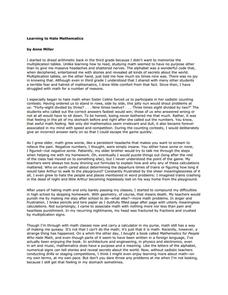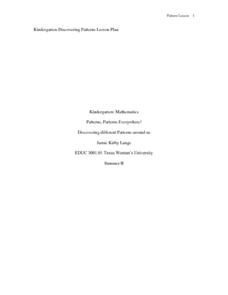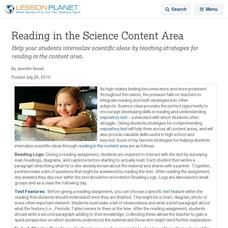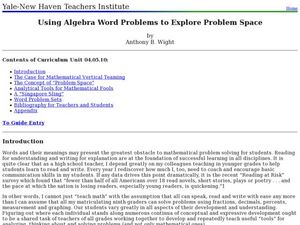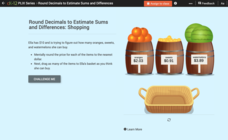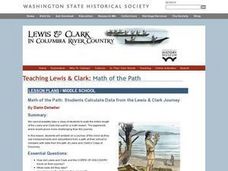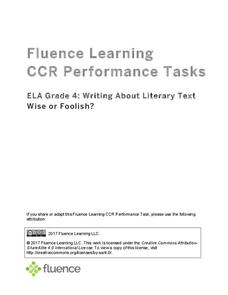Curated OER
Learning to Hate Math
Give your class a different kind of reading assignment with the text included here. Anne Miller's essay "Learning to Hate Mathematics" details a hatred of math that grew from early childhood and still haunts the author today. After...
K5 Learning
Ann and Frank
Challenge your third and fourth graders to look deeply into a text with a reading comprehension activity. After learners finish the short passage, they answer four questions that range in levels of difficulty and analysis.
K5 Learning
The Whistle
Get a quick peek into the life of Benjamin Franklin with a resource with a comprehension activity that asks learners to read a short tale, respond to a series of questions based on the passage, and then to identify the moral of...
K5 Learning
The Astronomy Project
A passage about an astronomy lesson may leave readers starstruck. Fifth graders read about a class's exploration into the makeup of the galaxy and its constellations before answering six questions about the terms and vocabulary...
National Security Agency
Classifying Triangles
Building on young mathematicians' prior knowledge of three-sided shapes, this lesson series explores the defining characteristics of different types of triangles. Starting with a shared reading of the children's book The Greedy...
Texas Woman’s University
Patterns, Patterns Everywhere!
Not only is pattern recognition an essential skill for young children to develop, it's also a lot of fun to teach! Over the course of this lesson, class members participate in shared readings, perform small group...
Curated OER
Graphing Stories Ice Breaker
Kick off the school year with some math fun! New classmates share information about themselves by using graphs and interpreting data. The goal is to use a general graph shape, such as linear or exponential, and create labels for the axes...
Curated OER
Reading in the Science Content Area
Help your students internalize scientific ideas by teaching strategies for reading in the content area.
EngageNY
Read Expressions in Which Letters Stand for Numbers
Pencil in the resource on writing verbal phrases into your lesson plans. The 15th installment of a 36-part module has scholars write verbal phases for algebraic expressions. They complete a set of problems to solidify this skill.
Curated OER
Growing Caterpillars
Explore multiplication through caterpillar study. Learners will view a caterpillar video clip and work with a group to determine how much they would weigh if they grew to be 3,000 times their size as does the caterpillar. They will...
Curated OER
Using Algebra to Explore Problem Space
Students apply their knowledge of math by rewriting word problems using equations. In this word problem lesson, students build upon previous knowledge as they set up the correct steps to solve word problems. This lesson is full of hints...
CK-12 Foundation
Problem Solving Plan, Estimation with Decimals: Shopping
Mathematicians go on a virtual shopping trip in an interactive designed to boost the concept of estimation. Scholars read and answer five questions—multiple-choice, true or false, and a discussion—with help from a drag-and-drop shopping...
Curated OER
Math of the Path: Students Calculate Data from the Lewis and Clark Journey
Middle schoolers use calculations to complete the same journey of Lewis and Clark. They answer questions along their way and share information they gather with the class. They compare their calculations with those made by Lewis and Clark.
Fluence Learning
Writing About Informational Text: Music and the Brain
Even if you've never picked up a musical instrument, chances are that music has directly impacted your mental and emotional development. Sixth graders engage in a reading activity in which they read two articles on the impact of music on...
Fluence Learning
Writing an Opinion: Buddies that Bark or Purr-fect Pets?
Which animal is best for you—a dog or cat? Why? Engage third graders in an opinion writing assessment that prompts them to read facts about both pets, and then write and decide which pet is best for them.
Mary Pope Osborne, Classroom Adventures Program
Mummies in the Morning Egyptian pyramids, hieroglyphics
Visit the Magic Treehouse and take your class on a trip through time with a reading of the children's book Mummies in the Morning. Using the story to spark an investigation into Egyptian culture, this literature unit engages...
EngageNY
Construct a Square and a Nine-Point Circle
Anyone can draw a square, but can you CONSTRUCT a square? Here is a resource that challenges math scholars to create steps to finish their own construction. They test their ability to read and follow directions to complete a construction...
Curated OER
St. Patrick’s Day
Combine math, creative writing, and leprechauns in a fun St. Patrick's Day activity! Using a bag of gold coins and marshmallows, kids write a math story about a leprechaun that includes a multi-step equation to solve.
Curriculum Corner
Math About Me!
Get to know your scholars with a worksheet that focuses on the important numbers that make up their life. Pupils answer questions such as how many letters are in their name, how old are they, how tall are they, how many siblings do they...
Scholastic
Adding and Subtracting Ten
Developing fluency with basic addition and subtraction is fundamental to the success of all young mathematicians. This four-day lesson series begins with learners using ten-frames and hundreds charts to recognize patterns when adding and...
Alabama Learning Exchange
Tiger Math Graphing
Learners practice various skills using the book Tiger Math: Learning to Graph from a Baby Tiger. After listening to the story, they create a pictograph using data collected from the text. They also color a picture of a tiger,...
Curated OER
A Remainder of One: A Math-Manipulative Lesson
Students listen to the reading of the book "A Remainder of One" and use math manipulatives to recreat "bug squadrons".
Curated OER
A Reading Graph
Students construct and interpret a "favorite classroom books" graph. In this literacy and math graphing activity, students choose a reduced size copy of the book cover that corresponds with the book(s) they chose to read during their...
Fluence Learning
Writing About Literary Text: Wise or Foolish?
A three-part assessment promotes reading comprehension skills. Class members read literary texts and take notes to discuss their findings, answer comprehension questions, write summaries, and complete charts.
